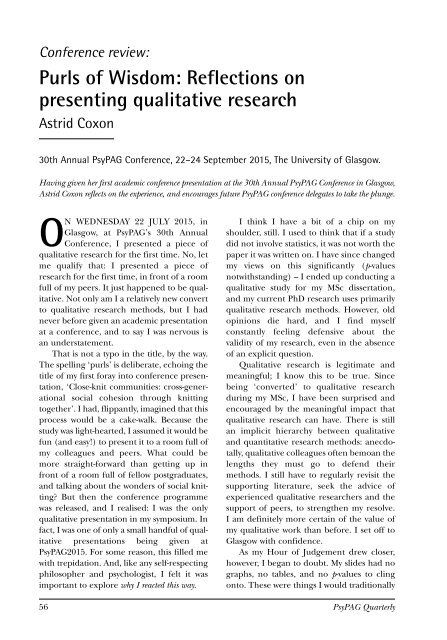Social Psychology Special Issue
PsyPAG-Quarterly-Issue-973
PsyPAG-Quarterly-Issue-973
You also want an ePaper? Increase the reach of your titles
YUMPU automatically turns print PDFs into web optimized ePapers that Google loves.
Conference review:<br />
Purls of Wisdom: Reflections on<br />
presenting qualitative research<br />
Astrid Coxon<br />
30th Annual PsyPAG Conference, 22–24 September 2015, The University of Glasgow.<br />
Having given her first academic conference presentation at the 30th Annual PsyPAG Conference in Glasgow,<br />
Astrid Coxon reflects on the experience, and encourages future PsyPAG conference delegates to take the plunge.<br />
ON WEDNESDAY 22 JULY 2015, in<br />
Glasgow, at PsyPAG’s 30th Annual<br />
Conference, I presented a piece of<br />
qualitative research for the first time. No, let<br />
me qualify that: I presented a piece of<br />
research for the first time, in front of a room<br />
full of my peers. It just happened to be qualitative.<br />
Not only am I a relatively new convert<br />
to qualitative research methods, but I had<br />
never before given an academic presentation<br />
at a conference, and to say I was nervous is<br />
an understatement.<br />
That is not a typo in the title, by the way.<br />
The spelling ‘purls’ is deliberate, echoing the<br />
title of my first foray into conference presentation,<br />
‘Close-knit communities: cross-generational<br />
social cohesion through knitting<br />
together’. I had, flippantly, imagined that this<br />
process would be a cake-walk. Because the<br />
study was light-hearted, I assumed it would be<br />
fun (and easy!) to present it to a room full of<br />
my colleagues and peers. What could be<br />
more straight-forward than getting up in<br />
front of a room full of fellow postgraduates,<br />
and talking about the wonders of social knitting?<br />
But then the conference programme<br />
was released, and I realised: I was the only<br />
qualitative presentation in my symposium. In<br />
fact, I was one of only a small handful of qualitative<br />
presentations being given at<br />
PsyPAG2015. For some reason, this filled me<br />
with trepidation. And, like any self-respecting<br />
philosopher and psychologist, I felt it was<br />
important to explore why I reacted this way.<br />
I think I have a bit of a chip on my<br />
shoulder, still. I used to think that if a study<br />
did not involve statistics, it was not worth the<br />
paper it was written on. I have since changed<br />
my views on this significantly (p-values<br />
notwithstanding) – I ended up conducting a<br />
qualitative study for my MSc dissertation,<br />
and my current PhD research uses primarily<br />
qualitative research methods. However, old<br />
opinions die hard, and I find myself<br />
constantly feeling defensive about the<br />
validity of my research, even in the absence<br />
of an explicit question.<br />
Qualitative research is legitimate and<br />
meaningful; I know this to be true. Since<br />
being ‘converted’ to qualitative research<br />
during my MSc, I have been surprised and<br />
encouraged by the meaningful impact that<br />
qualitative research can have. There is still<br />
an implicit hierarchy between qualitative<br />
and quantitative research methods: anecdotally,<br />
qualitative colleagues often bemoan the<br />
lengths they must go to defend their<br />
methods. I still have to regularly revisit the<br />
supporting literature, seek the advice of<br />
experienced qualitative researchers and the<br />
support of peers, to strengthen my resolve.<br />
I am definitely more certain of the value of<br />
my qualitative work than before. I set off to<br />
Glasgow with confidence.<br />
As my Hour of Judgement drew closer,<br />
however, I began to doubt. My slides had no<br />
graphs, no tables, and no p-values to cling<br />
onto. These were things I would traditionally<br />
56 PsyPAG Quarterly


